英语倒装句精讲及习题(附答案)
倒装句讲解及练习和答案
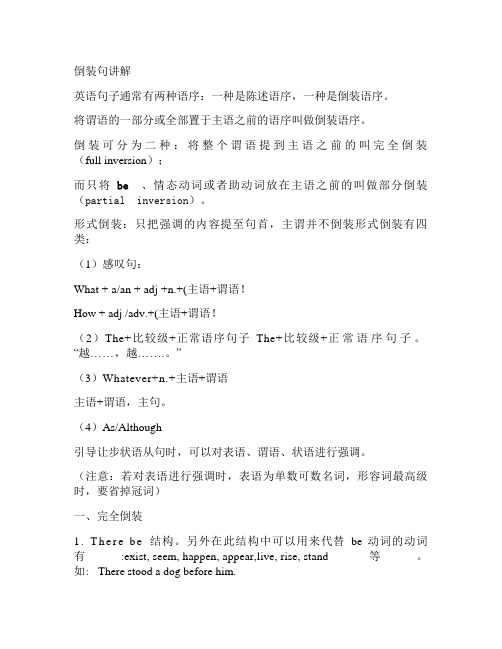
倒装句讲解英语句子通常有两种语序:一种是陈述语序,一种是倒装语序。
将谓语的一部分或全部置于主语之前的语序叫做倒装语序。
倒装可分为二种:将整个谓语提到主语之前的叫完全倒装(full inversion);而只将be 、情态动词或者助动词放在主语之前的叫做部分倒装(partial inversion)。
形式倒装:只把强调的内容提至句首,主谓并不倒装形式倒装有四类:(1)感叹句:What + a/an + adj +n.+(主语+谓语!How + adj /adv.+(主语+谓语!(2)The+比较级+正常语序句子The+比较级+正常语序句子。
“越……,越…….。
”(3)Whatever+n.+主语+谓语主语+谓语,主句。
(4)As/Although引导让步状语从句时,可以对表语、谓语、状语进行强调。
(注意:若对表语进行强调时,表语为单数可数名词,形容词最高级时,要省掉冠词)一、完全倒装1.T h e r e b e结构。
另外在此结构中可以用来代替be动词的动词有:exist, seem, happen, appear,live, rise, stand等。
如: There stood a dog before him.There exist different opinions on this question.2 (1.在以here、there、n o w、then等副词开头的句子里。
“Here, There, Now, Then + come (或be,go,lie,run + 主语"结构。
Here comes the old lady!Then came the hour we had been looking forward to.There comes the bus.Now comes your turn.如果主语是人称代词,就不用倒装。
如:Here you are.There she comes.(2.表示方向的副词out, in, up, down等置于句首,要用全部倒装。
初中英语倒装句的技巧及练习题及练习题(含答案)
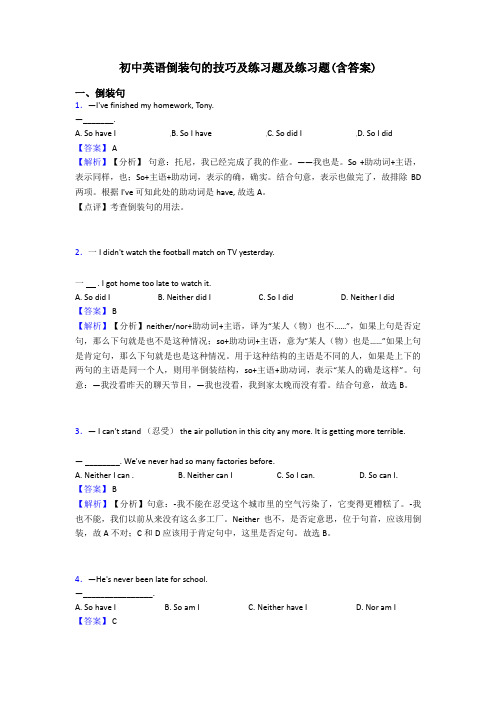
初中英语倒装句的技巧及练习题及练习题(含答案)一、倒装句1.—I've finished my homework, Tony.—_______.A. So have IB. So I haveC. So did ID. So I did【答案】 A【解析】【分析】句意:托尼,我已经完成了我的作业。
——我也是。
So +助动词+主语,表示同样,也;So+主语+助动词,表示的确,确实。
结合句意,表示也做完了,故排除BD 两项。
根据I've 可知此处的助动词是have, 故选A。
【点评】考查倒装句的用法。
2.一 I didn't watch the football match on TV yesterday.一 . I got home too late to watch it.A. So did IB. Neither did IC. So I didD. Neither I did【答案】 B【解析】【分析】neither/nor+助动词+主语,译为“某人(物)也不……”,如果上句是否定句,那么下句就是也不是这种情况;so+助动词+主语,意为“某人(物)也是……”如果上句是肯定句,那么下句就是也是这种情况。
用于这种结构的主语是不同的人,如果是上下的两句的主语是同一个人,则用半倒装结构,so+主语+助动词,表示“某人的确是这样”。
句意:—我没看昨天的聊天节目,—我也没看,我到家太晚而没有看。
结合句意,故选B。
3.— I can't stand (忍受) the air pollution in this city any more. It is getting more terrible.— ________. We've never had so many factories before.A. Neither I can .B. Neither can IC. So I can.D. So can I.【答案】 B【解析】【分析】句意:-我不能在忍受这个城市里的空气污染了,它变得更糟糕了。
必备英语倒装句技巧全解及练习题(含答案)及解析

必备英语倒装句技巧全解及练习题(含答案)及解析一、倒装句1.— I have never visited a paper factory.— .A. So have IB. I haven't nowC. Neither have I【答案】 C【解析】【分析】句意:-我从来没有参观过造纸厂。
-我也没去过。
根据句意可知这里表示的是否定的意思,故A可以先排除,因为so 的这个倒装的用法只能用在肯定句中,表示上面所说的情况也适用于另外一人。
在否定句应该用neither,当neither 位于句首时,应该用倒装的结构。
故选C。
【点评】考查倒装。
2.—Oh, my god! Recently I have put on 5 pounds.— . I think I should lose weight.A. So do IB. So have IC. Neither do ID. Neither have I【答案】 B【解析】【分析】句意:—啊,我的天呀!最近我长胖了五磅。
—我也是,我认为我应该减减肥了。
so +主语+助动词/情态动词/系动词:某某确实如此,主语与上文是同一人。
So+助动词/情态动词/系动词+主语:某某也如此,主语与上文不是同一人,表示后者适合前者。
上文是否定句,下文表示某某也不,用 neither +助动词+主语。
这些句式在时态上与前一个句子相同。
根据上句是肯定句,现在完成时态,主语与上句不同,故选B。
【点评】考查固定结构,牢记并熟练运用此结构,能举一反三,应对自如。
3.—We are not allowed to bring any snacks or drinks at the school meeting.— .A. Neither are weB. Neither do weC. So are weD. So do we【答案】 A【解析】【分析】句意:—我们在学校会议上不被允许带任何零食和饮料。
高中英语倒装句讲解以及习题(附答案)
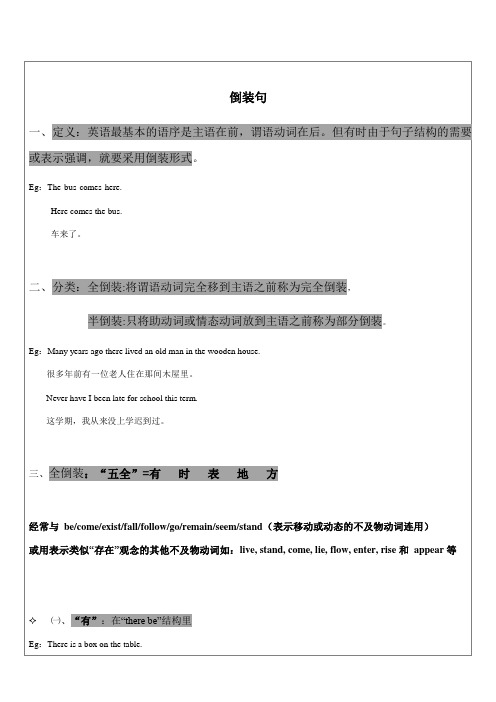
桌子上面有一个盒子。
✧㈡、“时”:表示时间副词,如:now,then,
Eg:Now comes your turn.
现在轮到你了。
✧㈢、“表”:表语放句子前,“表语+系动词+主语” 的结构
Eg:Present at the party were Mr. Green and many other guests.
格林先生和其他的客人在这个聚会上。
Seated on the ground are a group of young men.
一群年轻人坐在了地上。
✧㈣、“地”:地点状语放在句首
Eg:In south of the river lies a small factory.
小工厂位于河的南方。
From the valley came a cry.
山谷传来一阵哭声。
✧㈤、“方”:表方位的副词here, there 或out, in, up, down, away, off 等标志词放在句首 Eg:There lies a large wheat field in front of the house.
房子前面有一大片麦田。
Off all the lights went when I came in.
当我进来时,所有的灯都灭了。
四、半倒装:“八部”=不只让步也常需(虚)如此祝福✧㈠、“不”表示否定。
英语倒装句讲解和练习附答案
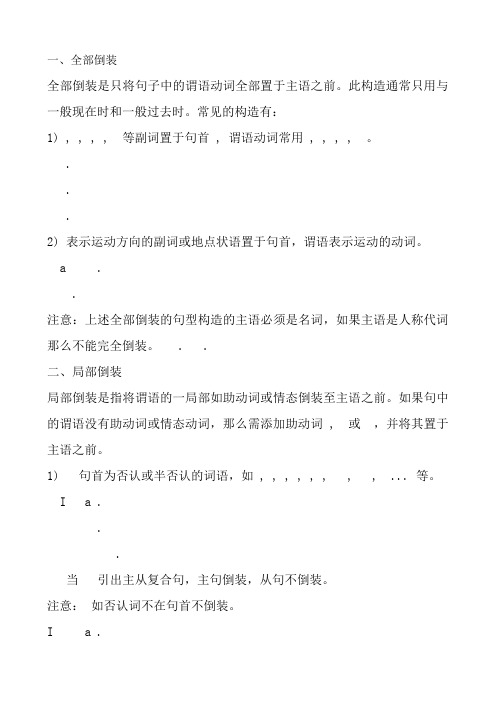
一、全部倒装全部倒装是只将句子中的谓语动词全部置于主语之前。
此构造通常只用与一般现在时和一般过去时。
常见的构造有:1) , , , , 等副词置于句首 , 谓语动词常用 , , , , 。
...2) 表示运动方向的副词或地点状语置于句首,谓语表示运动的动词。
a ..注意:上述全部倒装的句型构造的主语必须是名词,如果主语是人称代词那么不能完全倒装。
. .二、局部倒装局部倒装是指将谓语的一局部如助动词或情态倒装至主语之前。
如果句中的谓语没有助动词或情态动词,那么需添加助动词 , 或,并将其置于主语之前。
1) 句首为否认或半否认的词语,如 , , , , , , , , ... 等。
I a ...当引出主从复合句,主句倒装,从句不倒装。
注意:如否认词不在句首不倒装。
I a .典型例题1) 't I ?A. B.C. D.答案 A. 这是一个倒装问题。
当否认词语置于句首以表示强调时,其句中的主谓须用倒装构造。
这些否认词包括 , , , , , , 等。
此题的正常语序是 .2 〕 19 .A. B. C. 't D.答案 D. 看到 ... 的句型,我们知道为一倒装句,答案在 C , D 中选一个。
改写为正常语序为, 19. 现在将提前,后面就不能再用否认了 , 否那么意思就变了。
(1)以否认词开头作局部倒装如 , , ..., .a .a .典型例题.C. D.答案 D. 以具有否认意义的副词放在句首时,一般采用倒装句 ( 谓语前置 ) 。
这类表示否认意义的词有 , , , , , , , 以及 (), , ... ... 等等。
注意:只有当 ... 连接两个分句时,才在第一个分句用倒装构造。
如果置于句首的 ... 仅连接两个并列词语,不可用倒装构造。
I .(2), , 作局部倒装表示 " 也 " 、 " 也不 " 的句子要局部倒装。
. .'t , I.典型例题?'t , .A. 't IB. IC. I 'tD. I 't答案: B. 为增补意思 " 也不关心 " ,因此句子应倒装。
最新英语倒装句及其解题技巧及练习题(含答案)

最新英语倒装句及其解题技巧及练习题(含答案)一、倒装句1.—Tara has made great progress in English this term.—_______, and ________.A. So she has; so have youB. So she has; so you haveC. So has she;so you haveD. So has she; so have you【答案】 A【解析】【分析】句意:塔拉这学期的英语取得了很大的进步。
她的进步的确大,你的也不小。
so,位于分句或句子的开头,这种结构通常表示前面所说的情况也适合于另一个人(或事物),表示“我也这样”之类的概念。
其句型可归纳为: so + be / have / 助动词 / 情态动词 + 主语。
如果第二分句只是重复前句的意思,用来表示赞同时,so之后的主语和谓语就不能颠倒。
so,开头的倒装句一定要与上句的时态保持一致。
so开头的倒装句中的助动词或情态动词要根据人称的变化而变换。
所以选A。
【点评】考查倒装句的用法。
2.一 I didn't watch the football match on TV yesterday.一 . I got home too late to watch it.A. So did IB. Neither did IC. So I didD. Neither I did【答案】 B【解析】【分析】neither/nor+助动词+主语,译为“某人(物)也不……”,如果上句是否定句,那么下句就是也不是这种情况;so+助动词+主语,意为“某人(物)也是……”如果上句是肯定句,那么下句就是也是这种情况。
用于这种结构的主语是不同的人,如果是上下的两句的主语是同一个人,则用半倒装结构,so+主语+助动词,表示“某人的确是这样”。
句意:—我没看昨天的聊天节目,—我也没看,我到家太晚而没有看。
(完整版)倒装句全面讲解和练习(答案)

(完整版)倒装句全面讲解和练习(答案)初中英语倒装句(一)倒装句的意义1、适应一定的语法结构的需要,主要是指疑问句句型结构的需要。
E.g. Was the People’s Liberation Army founded in 1927?2、为了强调某一部分,而把这部分放到句首,构成倒装。
e.g. Never have I been late for school this term.(二)倒装的使用情况一、部分倒装:就是把谓语中的be动词、助动词或情态动词置于主语前面。
常见于下列几种情况:(一). only所修饰的副词,介词短语或状语从句放在句首时,要用:only+ 状语+ be /助动词/情态动词+主语及其他例如:Only when he told me the news did I know what had happened.注意:only修饰主语时,不需要倒装。
例如:Among all the people, only you know the truth.小试牛刀:Only in this way ________to make improvement in the operating system.A. you can hopeB. you did hopeC. can you hopeD. did you hope(二).含有否定意义的副词或连词放在句首时。
如:never, little, seldom, not, not only, not until, no sooner (…than), hardly (…when), rarely, scarcely, in no way等。
例如:We seldom get up at four in the morning.= Seldom do we get up at four in the morning.Not a single word from him could express his feelings.(1) hardly…when; scarcely…when…; no sooner…than… 可以用正常语序had hardly done when… did 或用倒装句式Hardly had +主语+ done when… did 句式。
英语倒装句常见题型及答题技巧及练习题(含答案)及解析

英语倒装句常见题型及答题技巧及练习题(含答案)及解析一、倒装句1.——My brother and I will go to the library tomorrow.—— ___. Shall we go together?A. So I doB. So do IC. So will ID. So I will【答案】 C【解析】【分析】句意:---明天我弟弟和我将要去图书馆。
---我也要去。
我们能一起去吗?表示某某人也一样,用So+be/助动词/情态动词+主语。
明天要去,应用情态动词will。
故选C。
【点评】考查倒装句的用法。
2.— I can't stand (忍受) the air pollution in this city any more. It is getting more terrible.— ________. We've never had so many factories before.A. Neither I can .B. Neither can IC. So I can.D. So can I.【答案】 B【解析】【分析】句意:-我不能在忍受这个城市里的空气污染了,它变得更糟糕了。
-我也不能,我们以前从来没有这么多工厂。
Neither也不,是否定意思,位于句首,应该用倒装,故A不对;C和D应该用于肯定句中,这里是否定句。
故选B。
3.— I think the plan is just a waste of time. What do you think?— Well, if you don't support the plan, ________.A. neither do IB. so do IC. neither will ID. so will I【答案】 C【解析】【分析】句意:——我认为这个计划只是在浪费时间。
您是怎么想的?——好,如果你不支持这个计划,我也不支持。
中考英语倒装句解题技巧讲解及练习题(含答案)

中考英语倒装句解题技巧讲解及练习题(含答案)一、倒装句1.–I usually go hiking with my friends.-- ____do I.A. NorB. SoC. Neither【答案】 B【解析】【分析】句意:一一我经常和朋发一起去徒步旅行。
一一我也是。
肯定句后跟”so+谓语+主语“,表示某人某物也……;否定句后跟"Neither/Nor+谓语+主语”,表示某人某物也不……。
本题前句是肯定句,故选B。
2.—Zhou Ming likes reading English magazines.—_______. It's good for English learning.A. So do IB. So am IC. So I do【答案】 A【解析】【分析】句意为:—周明喜欢读英语杂志。
—我也是。
这对英语学习由好处。
So+助动词+主语,完全倒装,表示“.......也......”。
故选A。
【点评】考查倒装句3.—More and more people prefer to walk rather than ride in cars.—________. Walking is good for health.A. So they areB. So are theyC. So they doD. So do they【答案】 C【解析】【分析】句意:——越来越多的人比起开车更喜欢走路。
——确实如此,走路对健康有好处。
A他们也是,B是啊,C是啊,D他们也是。
根据 Walking is good for health,可知表示确实是这样,起强调作用,用so+主语+助动词,因此排除B和D;再根据谓语prefer,实义动词,和主语people可知,应用助动词do,故选C。
【点评】考查倒装句,注意理解倒装句so do they和陈述句so they do的意义及用法区别。
【英语】英语倒装句解题技巧(超强)及练习题(含答案)

【英语】英语倒装句解题技巧(超强)及练习题(含答案)一、倒装句1.—I've finished my homework, Tony.—_______.A. So have IB. So I haveC. So did ID. So I did【答案】 A【解析】【分析】句意:托尼,我已经完成了我的作业。
——我也是。
So +助动词+主语,表示同样,也;So+主语+助动词,表示的确,确实。
结合句意,表示也做完了,故排除BD 两项。
根据I've 可知此处的助动词是have, 故选A。
【点评】考查倒装句的用法。
2.—Many students won 't take part in the after-school activities today.— .We have so much homework to do!A. So will IB. So do IC. Neither will ID. Neither do I【答案】 C【解析】【分析】句意:—今天许多学生不愿意参见课外活动。
—我也不愿意。
我们有那么多作业要做。
So+助动词+主语,表示与前面的肯定形式一致,表示也。
Neither+助动词+主语,表示与前面的否定形式一致,表示也不。
这两种部分倒装结构中的助动词与前一句的助动词一致,根据Many students won 't take part in the after-school activities today.可知此处won't表示否定形式,故用Neither+will+主语,故选C。
【点评】此题考查倒装句。
注意助动词与前一句的助动词一致。
3.—I didn't go to the cinema yesterday. What about you?—____________, because I was preparing for the project all the time.A. Nor do IB. Neither did IC. Neither am ID. Nor was I【答案】 B【解析】【分析】句意:—我昨天没有去电影院,你的?—我也没去,因为我一直在准备这个项目。
英语倒装句解题技巧讲解及练习题(含答案)及解析
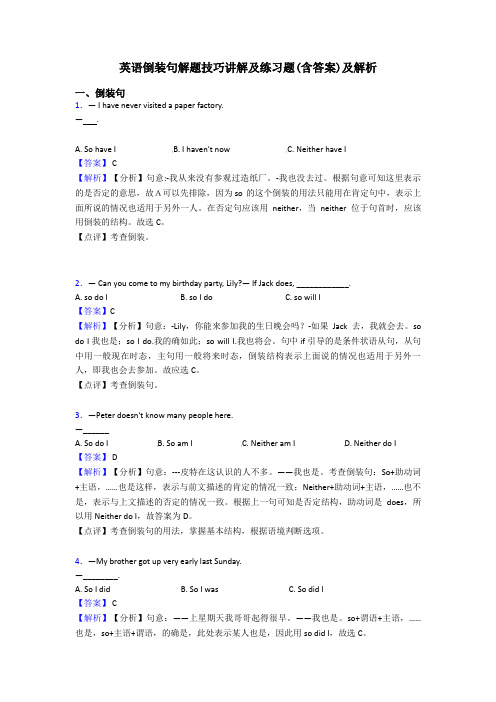
英语倒装句解题技巧讲解及练习题(含答案)及解析一、倒装句1.— I have never visited a paper factory.— .A. So have IB. I haven't nowC. Neither have I【答案】 C【解析】【分析】句意:-我从来没有参观过造纸厂。
-我也没去过。
根据句意可知这里表示的是否定的意思,故A可以先排除,因为so 的这个倒装的用法只能用在肯定句中,表示上面所说的情况也适用于另外一人。
在否定句应该用neither,当neither 位于句首时,应该用倒装的结构。
故选C。
【点评】考查倒装。
2.— Can you come to my birthday party, Lily?— If Jack does, ____________.A. so do IB. so I doC. so will I【答案】C【解析】【分析】句意:-Lily,你能来参加我的生日晚会吗?-如果Jack去,我就会去。
so do I我也是;so I do.我的确如此;so will I.我也将会。
句中if引导的是条件状语从句,从句中用一般现在时态,主句用一般将来时态,倒装结构表示上面说的情况也适用于另外一人,即我也会去参加。
故应选C。
【点评】考查倒装句。
3.—Peter doesn't know many people here.—______A. So do IB. So am IC. Neither am ID. Neither do I【答案】 D【解析】【分析】句意:---皮特在这认识的人不多。
——我也是。
考查倒装句:So+助动词+主语,……也是这样,表示与前文描述的肯定的情况一致;Neither+助动词+主语,……也不是,表示与上文描述的否定的情况一致。
根据上一句可知是否定结构,助动词是does,所以用Neither do I,故答案为D。
【点评】考查倒装句的用法,掌握基本结构,根据语境判断选项。
【英语】英语倒装句及其解题技巧及练习题(含答案)含解析
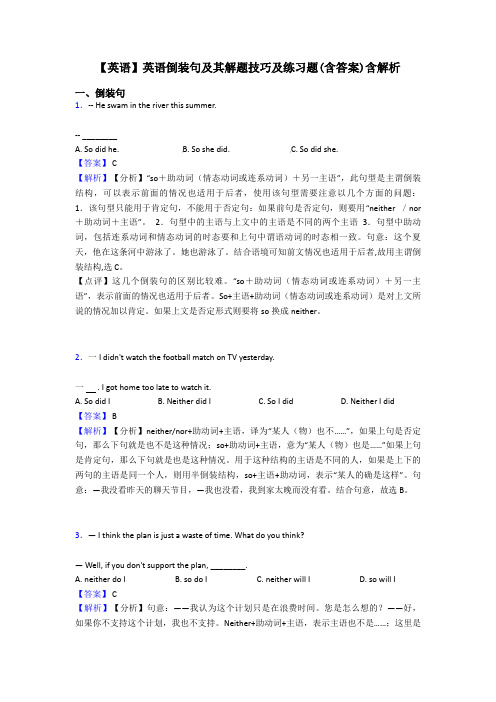
【英语】英语倒装句及其解题技巧及练习题(含答案)含解析一、倒装句1.-- He swam in the river this summer.-- ________A. So did he.B. So she did.C. So did she.【答案】 C【解析】【分析】“so+助动词(情态动词或连系动词)+另一主语”,此句型是主谓倒装结构,可以表示前面的情况也适用于后者,使用该句型需要注意以几个方面的问题:1.该句型只能用于肯定句,不能用于否定句:如果前句是否定句,则要用“neither /nor +助动词+主语”。
2.句型中的主语与上文中的主语是不同的两个主语3.句型中助动词,包括连系动词和情态动词的时态要和上句中谓语动词的时态相一致。
句意:这个夏天,他在这条河中游泳了。
她也游泳了。
结合语境可知前文情况也适用于后者,故用主谓倒装结构,选C。
【点评】这几个倒装句的区别比较难。
“so+助动词(情态动词或连系动词)+另一主语”,表示前面的情况也适用于后者。
So+主语+助动词(情态动词或连系动词)是对上文所说的情况加以肯定。
如果上文是否定形式则要将so换成neither。
2.一 I didn't watch the football match on TV yesterday.一 . I got home too late to watch it.A. So did IB. Neither did IC. So I didD. Neither I did【答案】 B【解析】【分析】neither/nor+助动词+主语,译为“某人(物)也不……”,如果上句是否定句,那么下句就是也不是这种情况;so+助动词+主语,意为“某人(物)也是……”如果上句是肯定句,那么下句就是也是这种情况。
用于这种结构的主语是不同的人,如果是上下的两句的主语是同一个人,则用半倒装结构,so+主语+助动词,表示“某人的确是这样”。
初中英语倒装句的技巧及练习题及练习题(含答案)含解析
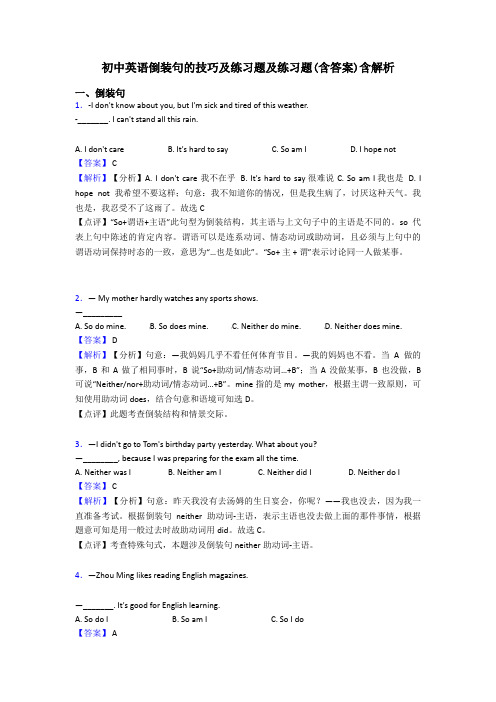
初中英语倒装句的技巧及练习题及练习题(含答案)含解析一、倒装句1.-I don't know about you, but I'm sick and tired of this weather.-_______. I can't stand all this rain.A. I don't careB. It's hard to sayC. So am ID. I hope not【答案】 C【解析】【分析】A. I don't care 我不在乎 B. It's hard to say很难说C. So am I 我也是 D. I hope not我希望不要这样;句意:我不知道你的情况,但是我生病了,讨厌这种天气。
我也是,我忍受不了这雨了。
故选C【点评】“So+谓语+主语”此句型为倒装结构,其主语与上文句子中的主语是不同的。
so代表上句中陈述的肯定内容。
谓语可以是连系动词、情态动词或助动词,且必须与上句中的谓语动词保持时态的一致,意思为“…也是如此”。
“So+ 主 + 谓”表示讨论同一人做某事。
2.— My mother hardly watches any sports shows.—_________A. So do mine.B. So does mine.C. Neither do mine.D. Neither does mine.【答案】 D【解析】【分析】句意:—我妈妈几乎不看任何体育节目。
—我的妈妈也不看。
当A做的事,B和A做了相同事时,B说“S o+助动词/情态动词…+B”;当A没做某事,B也没做,B 可说“Neither/nor+助动词/情态动词…+B”。
mine指的是my mother,根据主谓一致原则,可知使用助动词does,结合句意和语境可知选D。
【点评】此题考查倒装结构和情景交际。
3.—I didn't go to Tom's birthday party yesterday. What about you?—________, because I was preparing for the exam all the time.A. Neither was IB. Neither am IC. Neither did ID. Neither do I【答案】 C【解析】【分析】句意:昨天我没有去汤姆的生日宴会,你呢?——我也没去,因为我一直准备考试。
倒装句知识点归纳及练习(附答案)
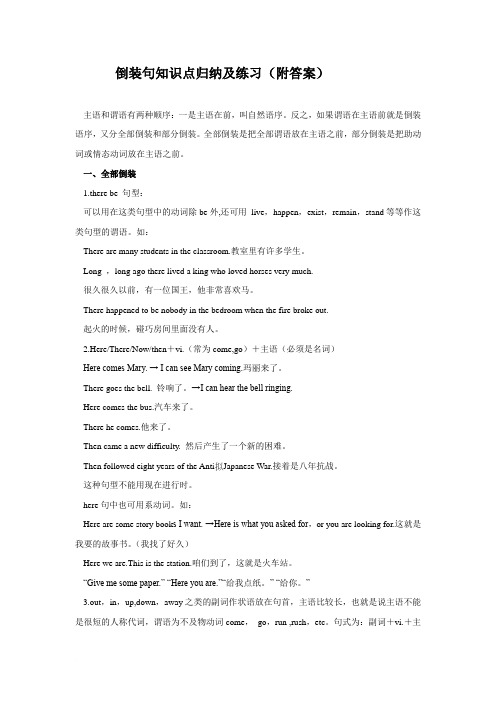
倒装句知识点归纳及练习(附答案)主语和谓语有两种顺序:一是主语在前,叫自然语序。
反之,如果谓语在主语前就是倒装语序,又分全部倒装和部分倒装。
全部倒装是把全部谓语放在主语之前,部分倒装是把助动词或情态动词放在主语之前。
一、全部倒装1.there be 句型:可以用在这类句型中的动词除be外,还可用live,happen,exist,remain,stand等等作这类句型的谓语。
如:There are many students in the classroom.教室里有许多学生。
Long ,long ago there lived a king who loved horses very much.很久很久以前,有一位国王,他非常喜欢马。
There happened to be nobody in the bedroom when the fire broke out.起火的时候,碰巧房间里面没有人。
2.Here/There/Now/then+vi.(常为come,go)+主语(必须是名词)Here comes Mary. → I can see Mary coming.玛丽来了。
There goes the bell. 铃响了。
→I can hear the bell ringing.Here comes the bus.汽车来了。
There he comes.他来了。
Then came a new difficulty. 然后产生了一个新的困难。
Then followed eight years of the Anti Japanese War.接着是八年抗战。
这种句型不能用现在进行时。
here句中也可用系动词。
如:Here are some story book s I want. →Here is what you asked for,or you are looking for.这就是我要的故事书。
英语倒装句讲解和练习附答案
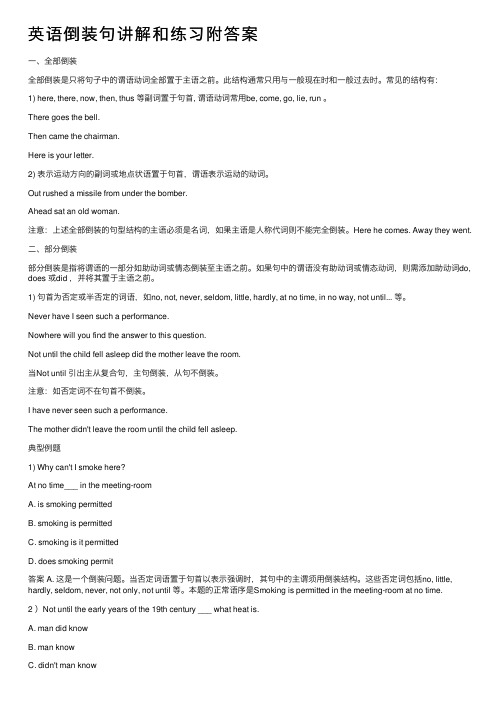
英语倒装句讲解和练习附答案⼀、全部倒装全部倒装是只将句⼦中的谓语动词全部置于主语之前。
此结构通常只⽤与⼀般现在时和⼀般过去时。
常见的结构有:1) here, there, now, then, thus 等副词置于句⾸, 谓语动词常⽤be, come, go, lie, run 。
There goes the bell.Then came the chairman.Here is your letter.2) 表⽰运动⽅向的副词或地点状语置于句⾸,谓语表⽰运动的动词。
Out rushed a missile from under the bomber.Ahead sat an old woman.注意:上述全部倒装的句型结构的主语必须是名词,如果主语是⼈称代词则不能完全倒装。
Here he comes. Away they went.⼆、部分倒装部分倒装是指将谓语的⼀部分如助动词或情态倒装⾄主语之前。
如果句中的谓语没有助动词或情态动词,则需添加助动词do, does 或did ,并将其置于主语之前。
1) 句⾸为否定或半否定的词语,如no, not, never, seldom, little, hardly, at no time, in no way, not until... 等。
Never have I seen such a performance.Nowhere will you find the answer to this question.Not until the child fell asleep did the mother leave the room.当Not until 引出主从复合句,主句倒装,从句不倒装。
注意:如否定词不在句⾸不倒装。
I have never seen such a performance.The mother didn't leave the room until the child fell asleep.典型例题1) Why can't I smoke here?At no time___ in the meeting-roomA. is smoking permittedB. smoking is permittedC. smoking is it permittedD. does smoking permit答案 A. 这是⼀个倒装问题。
高中英语语法学案:倒装句讲解与练习(含答案)
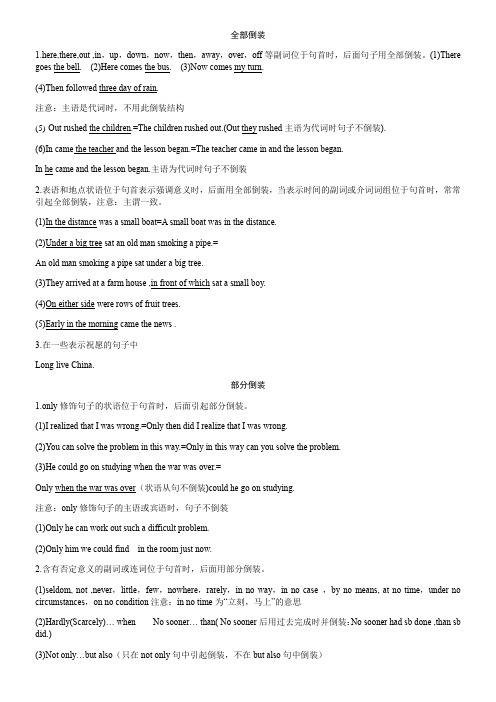
全部倒装1.here,there,out ,in,up,down,now,then,away,over,off等副词位于句首时,后面句子用全部倒装。
(1)There goes the bell. (2)Here comes the bus. (3)Now comes my turn.(4)Then followed three day of rain.注意:主语是代词时,不用此倒装结构(5)Out rushed the children.=The children rushed out.(Out they rushed主语为代词时句子不倒装).(6)In came the teacher and the lesson began.=The teacher came in and the lesson began.In he came and the lesson began.主语为代词时句子不倒装2.表语和地点状语位于句首表示强调意义时,后面用全部倒装,当表示时间的副词或介词词组位于句首时,常常引起全部倒装,注意:主谓一致。
(1)In the distance was a small boat=A small boat was in the distance.(2)Under a big tree sat an old man smoking a pipe.=An old man smoking a pipe sat under a big tree.(3)They arrived at a farm house ,in front of which sat a small boy.(4)On either side were rows of fruit trees.(5)Early in the morning came the news .3.在一些表示祝愿的句子中Long live China.部分倒装1.only修饰句子的状语位于句首时,后面引起部分倒装。
(完整版)倒装句精讲及练习(含答案)

倒装句的用法英语倒装句分为两种:1、整个谓语在前的句子,叫完全倒装。
Here comes the car.2、部分谓语(情态动词、助动词、连系动词)在前,谓语的主体部分仍在主语之后的句子,叫部分倒装句。
Only the n did he realize that he was wrong.必须弄清的两点:①若有主从句,哪句倒装。
②部分倒装还是完全倒装。
一、表示方位和时间的副词位于句首时(now ,the n here ,there,out ,i n ,up,dow n ,away ,back, off,on ),句子全部倒装。
注:主语是代词时,不倒装。
(如5, 6)1. Here comes the bus .2. There goes the bell .3. Away went the stude nts .4. Now comes the cha nee .Out rushed the childre n. he rushed.There comes the bus. he comes.注意:1.不能用进行时; 2.主语为人称代词时不倒装。
二、以介词短语表示的状语,提前位于句首时,全部倒装。
1.ln a lecture hall of a uni versity in En gla nd sits a professor .2.ln front of our school sta nds a tower .3. By either side of the river grow a lot of apple trees .4. At the top of the mountain sta nds a temple .5. Among the goods are Christmas trees,flowers and toys.三、表语位于句首时,倒装结构为“表语+连系动词+主语”A:形容词+连系动词+主语例I.Present at the meeting were Professor White,Professor Smith and many other guests.例2.过去分词+连系动词+主语Gone are the days whe n they could do what they liked to the Chin ese people.四、将so\neither \nor放在开头,表示“…也(不)…”的意思时,部分倒装注:表示“确实是这样”时,不倒装1. He went to the film last night.So did I .2. You must finish your work ,so must I .3.She is in terested in the story ,so am I .4. He didn ' t turn up .Neither did his brother .5. His mother told him not to go to the film .So he did.五、在if条件句中,通常可以省略if ,而将从句倒装条件:在if条件句,必须含有系动词were, 助动词had 和情态动词shouldI. Were he youn ger(=lf he were youn ger ),he would lear n skati ng .2.Should they forget (=If they should forget ) to bring a map with them ,they would get lost in the woods .3. Had they realized (=If they had realized ) how important the task was ,they wouldn ' t have refused to accept .4. Were I you ,I would help her .六、否定词或半否定词(never .little ,seldom ,not ,nowhere ,scarely ,few ,by no means ,at no time ) 位于句首 , 应部分倒装1. Never have I been there .2. Little did I know about it .3.Seldom did she come late to school .4.Not a single mistake did he make .5. By no means should you buy that kind of car .七、 以 notun til ,no sooner …tha n , hardly…whe n ,not only …but also 所弓丨导的状语放 在句首时 ,需要部分倒装 1. Not until 10 'clock will the library open .2. No sooner had I gone out than he came to see me .3. Hardly had the train arrived when I ran to meet my friend.4. Not only does she speak English but also she follows the British way of life .八、 only 及其修饰的状语位于句首时,后面的句子部分倒装。
高中英语语法倒装句讲解及练习(附答案)
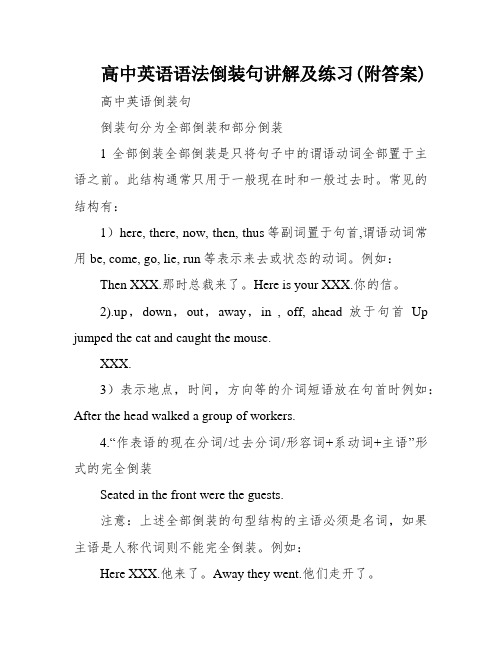
高中英语语法倒装句讲解及练习(附答案)高中英语倒装句倒装句分为全部倒装和部分倒装1全部倒装全部倒装是只将句子中的谓语动词全部置于主语之前。
此结构通常只用于一般现在时和一般过去时。
常见的结构有:1)here, there, now, then, thus等副词置于句首,谓语动词常用be, come, go, lie, run等表示来去或状态的动词。
例如:Then XXX.那时总裁来了。
Here is your XXX.你的信。
2).up,down,out,away,in , off, ahead放于句首Up jumped the cat and caught the mouse.XXX.3)表示地点,时间,方向等的介词短语放在句首时例如:After the head walked a group of workers.4.“作表语的现在分词/过去分词/形容词+系动词+主语”形式的完全倒装Seated in the front were the guests.注意:上述全部倒装的句型结构的主语必须是名词,如果主语是人称代词则不能完全倒装。
例如:Here XXX.他来了。
Away they went.他们走开了。
2部分倒装部分倒装是指将谓语的一部分如助动词或情态倒装至主语之前。
如果句子的谓语没有助动词或情态动词,则需添加助动词do, does或did,并将其置于主语之前。
1.句首为否认或半否认的词语,如no, not, never, seldom, little, hardly, rarely, scarely, in no way, under no circumstance, at no time决不,not until…等。
比方:Never have I XXX从未见过如此糟糕的表演。
Nowhere will you find the answer to this question.无论如何你不会找到这个问题的答案的。
(完整版)高中英语语法倒装句讲解及练习(附答案)
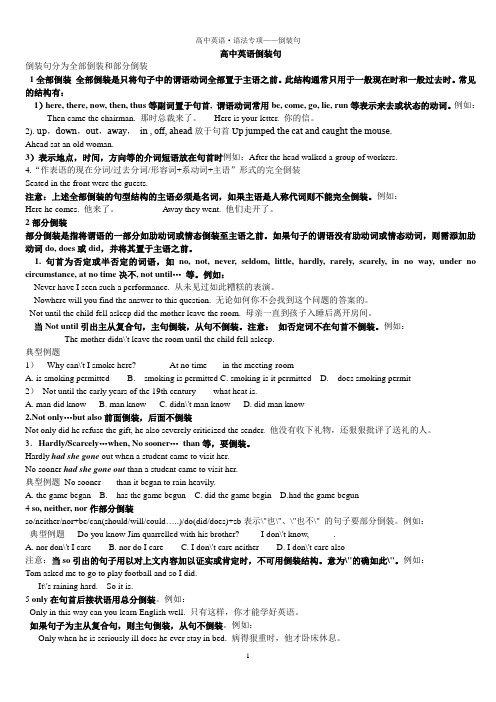
高中英语倒装句倒装句分为全部倒装和部分倒装1全部倒装全部倒装是只将句子中的谓语动词全部置于主语之前。
此结构通常只用于一般现在时和一般过去时。
常见的结构有:1)here, there, now, then, thus等副词置于句首, 谓语动词常用be, come, go, lie, run等表示来去或状态的动词。
例如:Then came the chairman. 那时总裁来了。
Here is your letter. 你的信。
2). up,down,out,away,in , off, ahead放于句首Up jumped the cat and caught the mouse.Ahead sat an old woman.3)表示地点,时间,方向等的介词短语放在句首时例如:After the head walked a group of workers.4.“作表语的现在分词/过去分词/形容词+系动词+主语”形式的完全倒装Seated in the front were the guests.注意:上述全部倒装的句型结构的主语必须是名词,如果主语是人称代词则不能完全倒装。
例如:Here he comes. 他来了。
Away they went. 他们走开了。
2部分倒装部分倒装是指将谓语的一部分如助动词或情态倒装至主语之前。
如果句子的谓语没有助动词或情态动词,则需添加助动词do, does或did,并将其置于主语之前。
1. 句首为否定或半否定的词语,如no, not, never, seldom, little, hardly, rarely, scarely, in no way, under no circumstance, at no time决不, not until…等。
例如:Never have I seen such a performance. 从未见过如此糟糕的表演。
Nowhere will you find the answer to this question. 无论如何你不会找到这个问题的答案的。
- 1、下载文档前请自行甄别文档内容的完整性,平台不提供额外的编辑、内容补充、找答案等附加服务。
- 2、"仅部分预览"的文档,不可在线预览部分如存在完整性等问题,可反馈申请退款(可完整预览的文档不适用该条件!)。
- 3、如文档侵犯您的权益,请联系客服反馈,我们会尽快为您处理(人工客服工作时间:9:00-18:30)。
英语句子的自然语序是主语在前,谓语动词在后。
把谓语动词放在主语之前,就叫倒装结构。
如果全部谓语放在主语之前,叫全部倒装;只把助动词或情态动词放在主语之前就叫部分倒装。
一、完全倒装1.时间状语now,then等,地点状语here,there, out,in,up,down,away等副词位于句首①Here comes the bus. ②There goes the bell. ③Now comes your turn. ④Out went the children. 当代词作主语时,主谓语序不变。
例如:⑤Here it is. 在这儿。
⑥Here he comes. 他来了。
2.当句首状语为表示时间或地点的介词词组时,也常常引起全部倒装①在城市南部坐落着一家钢铁工厂。
South of the city lies a big steel factory.②从山谷里传来了一阵可怕的声音。
From the valley came a frightening sound.3.表语置于句首时,倒装结构为“表语+连系动词+主语”1)形容词+连系动词+主语出席会议的有怀特教授,史密斯教授,格林教授及其他嘉宾。
Present at the meeting were Professor White, Professor Smith, Professor Greenand many other guests2)过去分词+连系动词+主语他们可以随心所欲的日子过去了。
Gone are the days when they would do what they liked.二、部分倒装1.用于疑问句Do you speak English?2.If引导的条件状语从句谓语动词为were, had或should时,可省去if,把那三个词挪至句首。
Had you reviewed your lessons, you might have passed the examination.Were there enough hands, we should go on with the project.Should I be free tomorrow, I will come to the party.3.用于“形容词(或名词、动词)+as(though)引导的让步状语从句中”①Pretty as she is, she is not clever. ②Try as he could, he might fall again.如果从句的表语是名词,其名词前不加任何冠词。
①尽管他还是个孩子,他不得不去谋生。
Child as he was, he had to make a living.4.用于否定词never, hardly, seldom, scarcely, barely, little, often, at no time, at no time, not only+部分倒装but+不倒装, not once,no sooner+部分倒装… than+不倒装…,hardly+部分倒装… when+不倒装和not until开头的句型中①我再也不做这个了。
Never shall I do this again.②他几乎不了解这个女人是谁。
Little did he know who the woman was.③直到老师开始上课他才写完作业。
Not until the teacher came did he finish his homework.④他刚迈出家门电话铃就响了。
No sooner had he stepped out of the house than the phone rang.⑤我刚到她们就要走了。
Hardly had I arrived when they had to leave.5.用于so,nor,neither开头的句子,表示重复前句部分内容,原句的谓语应与前句谓语的时态、形式相一致.若表示强调前句内容,则不倒装。
①He has been to beijing. So have I. ② Li Wei can't answer the question. Neither can I.③Li Lei failed the exam, so he did. ④ Lucy likes paintings, so she does.6. 用于only开头的句子(only后面跟副词、介词短语或状语从句)。
①只有以这种方式我们才能取得进步。
Only in this way can we make progress.②只有当他告诉我的时候我才意识到他陷入到了什么样的麻烦中。
Only when he told me did I realize what trouble he was in.7)用于某些表示祝愿的句子。
祝你成功!May you succeed!1.I like sports and ____ my brother.A.so does B.so is C.so D.so like2.She is not fond of cooking, ____ I.A.so am B.nor am C.neither do D.nor do3.Only in this way ____ progress in your English.A.you make B.can you makeC.you be able to make D.will you able to make4. ____ , he doesn't study well.A.As he is clever B.He is as clever C.Clever as he is D.As clever he is 5.John won first prize in the contest. ____ .A.So he did B.So did he C.So he did, too D.So did he, too 6.After that we never saw her again, nor ____ from her.A.did we hear B.we heard C.had we heard D.we have heard 7.Not until I began to work ____ how much time I had wasted.A.didn't I realize B.did I realize C.I did't realize D.I realize 8.Not only ______ polluted but ______ crowded.A.was the city; were the streets B.the city was; were the streetsC.was the city; the streets were D.the city was; the streets were9.Not once ______ his view of life.A.did the gentleman mention B.the gentleman mentioned thatC.the gentleman mentioned D.does the gentleman mentioned10.No sooner ______ than he realized that he should have remained silent.A.had the words been spoken B.the words had spokenC.the words had been spoken D.had the words spoken11. Hearing the dog barking fiercely, away _____.A. fleeing the thiefB. was fleeing the thiefC. the thief was fleeingD. fled the thief12. For a moment nothing happened. Then all shouting together.A. voices had comeB. came voicesC. voices would comeD. did voices come13. I feel it is you as well as your wife that____ for your son’s bad performances at school.A. are to blameB. are going to blameC. are to be blameD. is to be blamed14. ____to the doctor right away, he might have been alive today.A. If he wentB. Had he goneC. Were he goneD. If he should go15. Only when thousands of flowers bloom together .A. spring will be considered hereB. could spring be considering hereC. can spring be considered hereD. spring can be considered here16. Never in my life such a thing.A. I have heard of or seenB. I had heard of or seenC. have I heard of or seenD. did I hear of or seen17. Seldom TV during the day.A. they watchB. are they watchingC. have they watchedD. do they watch18. nor read English.A. Can’t he either writeB. He can neither writeC. Can he neither writeD. Neither he can write19. Hardly ______ the airport when he started for his Destination.A.I had reached B.had I reached C.I had reached D.had I reached to 20.Scarcely ______ asleep when a knock at the Door a wakened her.A.she had fallen B.had she fallen C.she had fell D.had she fell 21. ______ me, tell him to wait for me.A.Should anyone call B. Anyone should callC. Would anyone call D. Anyone would call22. Little ______ that the Distirct was so rich in resoures.A. we suspected B. did we suspect C. we suspect D. we suspect that ABBCA ABCAA DBABC CDBBB AB。
